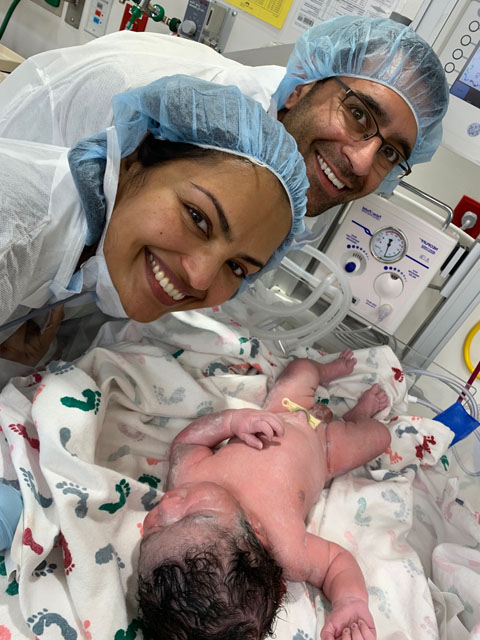2243 people reached on Lassi with Lavina FB page – 271 engagements – FB Insights
173 Likes on FB
353 views on LinkedIn
43 Likes on Instagram
Surrogacy – Winning the Baby Lottery!
Meet three women who took the route less traveled.
[dropcap] M[/dropcap]ost women take childbirth for granted but for many it seems an impossible dream. There are so many women who just cannot become mothers, no matter how hard they try.
There are many young women who agonize about starting a family during their child-bearing years and are searching for solutions. In an earlier feature we had explored the route of adoption which can create families where none existed. For others, there is the less traveled way of surrogacy – conceiving their biological child through surrogacy.
Komal Mulchandani – Another Route to Motherhood
[dropcap]K[/dropcap]omal Mulchandani of Jersey City, New Jersey, was one such woman who with her husband Jaideep tried many different paths to having a family and finally decided to go with surrogacy, a controversial method about which we don’t know much. For Komal and Jaideep, it was a bold step and they took it – and now have a great family of adorable twin daughters. You can read their story here
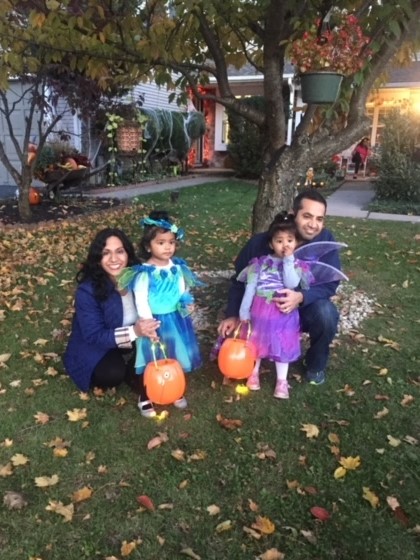
[dropcap]W[/dropcap]e shared their story in Lassi with Lavina in 2017 – their girls are now four and a half years old and doing great. However, since the Indian government has clamped down on couples from abroad resorting to surrogate mothers in India, we spoke with two other Indian-American women who have found surrogates in the US and share the procedures and experiences here.

Vaishali Deshpande: The Grief of Delivering a Still-Born
[dropcap] “I[/dropcap]t was heartbreaking losing my baby in the womb after bonding and celebrating and having to deliver a stillborn was the worst experience I have ever had. I would rather deal with the financial stress of having a surrogate than having to go through that again.”
Vaishali Deshpande, a New Jersey wedding planner, and her husband Aalok are on their way to becoming parents through surrogacy and shares her experiences in order to help others. “I knew around age 25 it would be slightly difficult to have kids because I had PCOS, but not as difficult as it was. I had always wanted to adopt a child since I was young but after getting married my husband wanted his own biological child, so we thought we would try this way first and then if it didn’t work out, then we would move to adoption.”
After three years of trying to conceive naturally, they consulted a doctor and tried various solutions including Clomid medication, IUI and IVF. The three attempts at IUI resulted in two eptopic pregnancies which were terminated with Methotrexate and a D & C. Next, they tried IVF in which they did 5 rounds which yielded multiple miscarriages and one still birth.
This took them to the other alternate – surrogacy which is still regarded as an uncommon way of achieving parenthood. She did meet with other clinics and tried to do it overseas initially but the current political climate and COVID-19 proved to potentially cause issues so they opted to do it domestically. It is much easier to do it in the states, she says.
“There is a lot of stress if you are trying to manage the agencies from overseas. If you have relatives who can oversee the process in the foreign country, then that may be a good option but for 9 months, it is very stressful having only the communication from the agency and not being able to physically see the progress of the pregnancy.” Many couples have a hard time explaining the process to their parents. In asking how difficult it was to discuss with her parents, Vaishali says, “It was not something difficult but rather we just needed to explain to them how it works. They have always been very supportive but were even more understanding once they knew the steps we had to embark on and what we needed from them.”
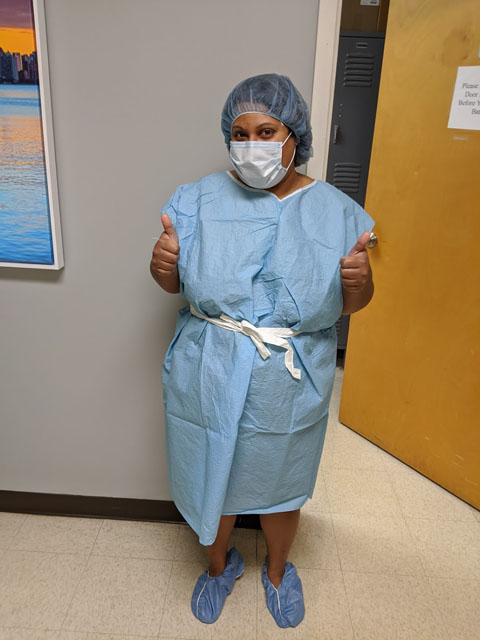
[dropcap]C[/dropcap]urrently the Deshpande’s have researched and found a surrogacy agency and a surrogate. She says the difficult part has been choosing the right agency and learning the entire process to make sure everything is included in the contract so they don’t face any challenges during the pregnancy and after the child is born. She consulted other couples who had used surrogacy and learned the costs would be $125,000 – $150,000. The surrogate gets around $35,000 – $55,000 plus medical and maternal need costs and the rest of the amount goes towards the agency, lawyers, doctors, medical costs and travel costs.
Surrogacy is still an unchartered territory and there are many horror stories about a surrogacy gone wrong. “I have heard that getting custody of the child has been a nightmare for parents – such as courts not recognizing them as parents,” she says. “Nowadays the laws have changed in the favor of the intended parent. The agency also helps to manage how the surrogates carry out the pregnancy and making sure they care for the baby properly.”
Asked about the hardest parts of giving over the ‘carrying’ experience to another, she says, “After being pregnant and having the baby moving around inside you, it feels like a part of you was taken away. I loved being pregnant knowing the baby was inside and bonding with me. I will miss the bonding more than anything but our surrogate is allowing us to come to the doctor’s appointments so it will be nice to at least hear the heartbeat and see the baby on the ultrasounds.”
In order to safeguard the health of their baby, the Deshpandes plan to be in routine communication with the surrogate and make sure she is staying healthy and doing whatever she needs to maintain a healthy pregnancy.
They are also ensuring that they are protected in the contract for financial maxes, health care and life insurance coverage. Her other suggestions: “Also learn as much as you can about the surrogate. Stay in touch as much as possible and be engaged so you know how she is carrying the pregnancy and how healthy she is staying.”
[dropcap]W[/dropcap]ould Vaishali recommend this path to other women? “I would definitely recommend to anyone who is having a difficult time getting pregnant – especially to those who have medical conditions which can cause complications during the pregnancy,” she says. “It was heartbreaking losing my baby in the womb after bonding and celebrating and having to deliver a stillborn was the worst experience I have ever had. I would rather deal with the financial stress of having a surrogate than having to go through that again.”
The Deshpandes have found a surrogate and are just finalizing the legal contract and then she will be beginning the implant process. Vaishali’s journey has just begun but she is very hopeful of its success and finally having her baby in her arms.
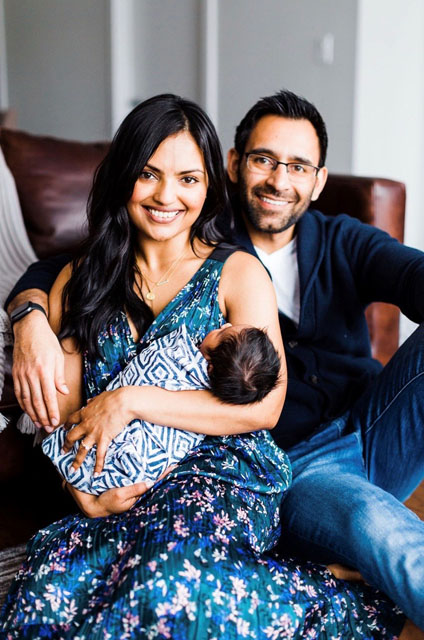
Deny Talakshi : “A Type 1 Diabetic, I could not carry a pregnancy without risk!”
[dropcap]L[/dropcap]ast December, in the midst of winter, Deny Talakshi, who is a pediatric nurse practitioner, became a mother of a healthy baby boy and spent a wonderful holiday season cozied up with her new son and husband Faroukh, who is a nephrologist. The baby came via surrogacy and as Deny explains, “This was a plan my husband and I discussed early in our relationship and our family and friends fully supported our decision once we began the process. They were all thrilled about us starting a family and happy we were doing it in a safe way.”
Did she ever think this day would come? She says: “As a Type 1 Diabetic, I knew that there would need to be planning involved into having a family. I knew early on that I may not be able to carry a pregnancy without risk to myself or the baby. Mine and my baby’s health were the most important factors to consider in which ever avenue we chose to have a family.”
They did not try any other treatments or options, but decided to go the surrogacy route. “Doing it locally was the best option for us. We considered doing it in India until we learned that it’s illegal now. Having someone locally allowed us to be at every OB appointment and make it in time for the delivery.
They lived in a different state during the pregnancy and immediately following the delivery. Deny recalls, “We fortunately have very supportive family and friends. Everyone we told about the surrogacy- coworkers, local friends, our Orange Theory Fitness family- were thrilled for us and supported us throughout the process. That being said, my husband and I are pretty private people and, while we didn’t limit whom we told, we wanted to protect our privacy. I don’t think that would have made anyone less supportive, but it did limit the number of people who knew our path to having a baby.”

[dropcap]S[/dropcap]ince the costs of surrogacy are quite high, we asked Deny for the details of her experience. She says, “We started when I was in between jobs to allow flexibility because, as I got closer to the egg retrieval, I had more clinic visits. First, I took shots daily to stimulate my ovaries. There were interval ultrasounds at my doctor’s office to monitor the quantity and growth of my eggs. As we got closer to the egg retrieval, I would have more frequent imaging done in order for them to tell me when to take the trigger injection. Afterwards, I had a window of a few days to undergo egg retrieval. After we had embryos, finding a surrogate took about 4 months, but we lived in small state and wanted someone locally, both of which added to the wait. In total, it was roughly $100, 000 for the whole process. The surrogate costs were roughly $40,000 and all other fees (admin, medical procedures/imaging, doctor visits, legal fees) cost about $60,000.”
Asked to share her actual experiences as compared to stories she might have heard, Deny said, “My husband and I didn’t know anyone who had gone through the surrogacy process. My in-laws knew a couple their age who went through surrogacy in India over 15 years ago. We spoke to them before we started our process, but, besides missing out on the pregnancy, they had a positive experience and did it twice for both of their children. Thankfully no nightmares! Our experience was very positive and one we plan to do again!”
Still it must have been hard to forgo the carrying experience, and Deny admits that was the hardest part of giving over that experience to someone else: “I have Type A tendencies and giving over control was tough. But I knew from the beginning that this was going to allow us to have a safe pregnancy with no risk to either me or the baby. Sure, we could have asked our surrogate to eat all organic, vegan, not processed foods and she would have obliged, but we wanted her continue having control in decisions that affected her lifestyle and family.
The surrogate had gone through pregnancy 4 times for 3 of her own children and twins for her last surrogate family. She was far more versed in pregnancy than I was and, in getting to know her, I trusted her. Minimizing stress on her and her family so that she could enjoy this pregnancy outweighed the lack of control issues.”

[dropcap]W[/dropcap]hat are the cautions she would suggest in taking on a surrogate?
“I strongly recommend going through an agency because there are a lot of legal safeguards that need to be put in place for both you and the surrogate. This makes sure that both parties are protected throughout the process and minimizes issues during and after the pregnancy.”
Should one keep in touch with the surrogate after the birth? Says Deny, “We’ve had some contact with our surrogate since our son was born, but not much. Our preference was not to keep contact after birth and our surrogate viewed the relationship in the same way. As odd as it may sound, it was transactional. We trusted her whole-heartedly, got along very well and I couldn’t have asked for a better person to carry this pregnancy; however, we are strangers who were in each other’s lives for a specific period of time. We’ve since moved across the country, but if my son ever wanted to see the surrogate or meet her, I would happily text her.”
[dropcap]W[/dropcap]as Deny at least able to safeguard the health of her baby? Deny says they opted for genetic testing on all of their embryos and thankfully had 8 viable ones – 6 girls and 2 boys. The surrogate also had to do drug screenings. “In the beginning of the pregnancy while we were building our relationship with the surrogate, it was tough to think about someone whom we barely knew carrying our baby. But it takes time to build trust and she quickly convinced us of that,” she says.
Now that Deny is the mother of a healthy baby boy, would she recommend this route to others? “I would absolutely recommend surrogacy to any couple wanting to have a baby. It can be financially challenging, but this was important to us and we saved up and made it a reality,” she says.
“The rewards of the experience of course are many. Obviously preserving the health of my family was a huge reward of this experience. We could not be happier with our decision and the outcome of having our healthy, happy son.”
Would she do it again? “Yes!” is her emphatic one-word answer.

Komal Mulchandani – “I would do it again in a Heartbeat!”
[dropcap]F[/dropcap]inally I turned to Komal Mulchandani whose girls are now four and a half years old, and asked her some questions on the whole experience to share her insights with Vaishali, Deny and our readers.
Looking back, do you have any regrets?
None whatsoever! I am blessed to have my two girls and seeing them grow up into beautiful young girls and knowing that I did this, makes all the hard work worth it.
They always say what doesn’t break you only makes you stronger. It was one of the most stressful periods of my life but also the time where I learnt the most and really tested my limits and learned what I was really capable of.
Both sets of grandparents got their wish with two beautful grandchildren who are the apple of their eyes. Once a month the kids stay at their nani and nana’s(maternal grandparents) house so they can get 1 on 1 time with them. Obviously they get spoiled rotten with lots of sweets and movies galore, but the joy that this time gives both the grandparents and the kids is priceless. Thanks to technology they are able to Facetime and video chat their grandparents anytime they want, which has been a real blessing, especially during the pandemic.

Will you have to explain to your kids about the surrogacy process when they are older?
They are definitely too young still. We will eventually tell them when they are old enough to understand. But it is not something that we intend to hide. The approach we use when they are old enough to understand will be critical as to how they view us as parents. They are our heartbeats and my biggest fear is losing their love as it would be like having no heartbeat!
Would you do it again?
Absolutely! In a heartbeat! However, Since surrogacy is no longer open to foreign nationals in India, it is not an option for us at this time and doing it here in the United States has become very cumbersome with all the legalities involved. Now with COVID in the picture, things have become even more difficult.
What advice do you have for Vaishali, Deny and women like them who might be entering into this way of motherhood?
Motherhood is something that is an ever evolving process. You learn something new every day. No one is perfect, and no one should base their value as a mother based on other people’s opinions or stereotypes as to what a true mother is.
Many people made me feel like that because I didn’t give birth to my children, I am not their true mother. However, I disagree as I have given my heart and soul into raising my two girls, and I wouldn’t have it any other way. I may not have carried them and experienced the feeling of having a human inside me, but having my girls makes me complete in a way nothing else could ever do.
Just do your best every day and take comfort in the fact that motherhood is one of the toughest challenges in life, and as long as your kids are safe and healthy, you’ve won half the battle.
Everyone who learns about what we went through are in awe and really amazed that we persevered for two long years and overcame so many obstacles such as going through four surrogates prior to finding the one who actually carried the babies for us and going through numerous rounds of queries with the Indian Council of Medical Research to ship our embryos from the USA to India – before finally reaping the benefits of our hard work, a.k.a., our lovely girls!
Related Article:
Everything You Wanted to Know About Surrogacy but were Afraid to Ask
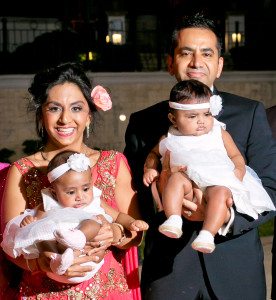
Links to information about surrogacy
What is Surrogacy? Surrogates, Parents and Egg Donors
https://www.circlesurrogacy.com/
The US Surrogacy Law Map
The US Surrogacy Law Map
Harvard Health Blog:
Surrogacy: Who decides to become a gestational carrier?

